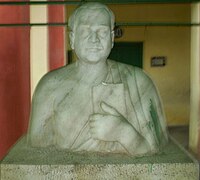Dwarkanath Vidyabhusan
| Dwarkanath Vidyabhusan | |
|---|---|

Statue:Dwarkanath Vidyabhusan
|
|
| Born | 1820 Chingripota, South 24 Parganas |
| Died | 22 August 1886 Satna, Madhya Pradesh |
| Occupation | Scholar, editor, founder |
Dwarkanath Vidyabhusan (Bengali: দ্বারকানাথ বিদ্যাভূষণ) (1820 - 22 August 1886) was an Indian scholar, editor and publisher of the trend-setting weekly Bengali newspaper Somprakash.
His father, Harachandra Bhattacharya (better known as Nyayratna) was a scholar. He had studied under Kashinath Tarkalankar, who had a popular traditional centre of education at Hatibagan in north Kolkata, Nyayratna taught in the traditional centres of Sanskrit-based education called tol-chatuspatis and also taught some boys in his spare time at his home. Amongst his renowned students were Ishwar Chandra Gupta and Ramtanu Lahiri.
After initial education in the traditional centre of village education, the pathsala, Dwarkanath joined Sanskrit College, Kolkata in 1832, and studied there up to 1845, winning many prizes and earning fame as a scholar. He won the title of Vidyabhusan in his last examination. He had a short stint as a teacher in Fort William College and then joined Sanskrit College as a librarian. He later rose to the position of a professor and also assisted Ishwar Chandra Vidyasagar, when he was principal of the college.
A strong supporter of the women's education, Dwarkanath Vidyabhusan joined other liberals to support Bethune School (established by John Elliot Drinkwater Bethune) for twenty years.
In 1856, his father established a printing press. It must be mentioned that it was an age when publishers concentrated on an incongruous double bill of religion and erotica but tastes had started changing. In 1857, forty-six Indian-owned printing presses put out 322 books for sale. Although religion still held sway, erotica had started ebbing out. However, his father fell ill and died shortly after establishing the printing press. Vidyabhusan inherited the press and published in Bengali two volumes on the history of Greece and history of Rome, he had written. That was possibly the first time that fat volumes of history written in easy flowing Bengali language was published and it immediately established Vidybhusan as a writer.
...
Wikipedia
